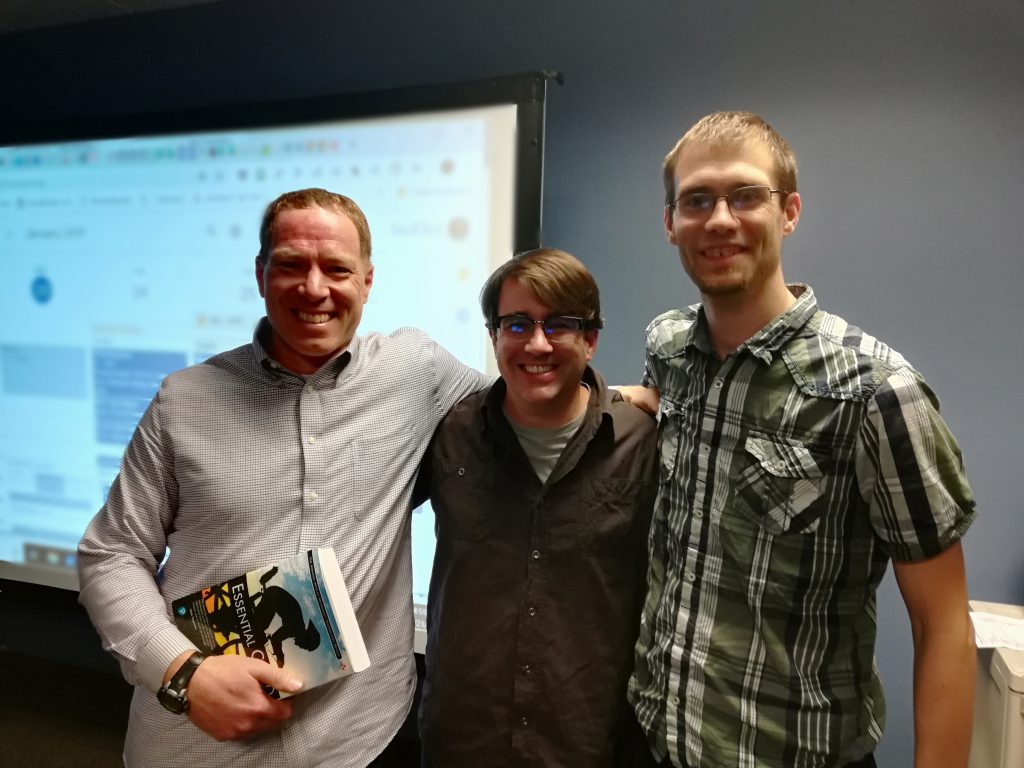Teaching C# at Eastern Washington University
Three adjunct professors from IntelliTect continue to teach tomorrow’s engineers industry-standard tooling and languages in the computer science program at Eastern Washington University (EWU).
For the past three years, I, along with senior software architects Kevin Bost and Michael Stokesbary, have been teaching computer science at EWU, located just outside Spokane, Washington. Specifically, we teach classes on the programming language C# and a web-based class on ASP.NET Core.
For me, teaching C# at the university provides an opportunity to encourage students in my passion for software engineering. Students continue to show up week after week. It’s humbling. It is my hope that their dedication to learning will provide them with a great foundation in their careers once they graduate. More importantly, there is a major shortage of developers in the job market today. Participating in the solution to that problem by providing direction and teaching needed skills is an honor.

Three of Eastern Washington’s newest adjunct professors (pictured from left to right – Mark Michaelis, Michael Stokesbary, and Kevin Bost) pose with their textbook, written by Mark.
The Importance of Current Tech
For several years, I felt disappointed with the skill set of the students graduating from universities in the Spokane area. They had rudimentary experience in C# at best, and they lacked any experience with DevOps – including Git, Unit Testing, automated build, and cloud deployment and hosting. Web development skills were also subpar, with very little knowledge of JavaScript, TypeScript, CSS, webpack, and any Web UI framework.
It was becoming increasingly uncommon for us to hire local graduates. We found that students didn’t always know the current development technologies and processes we use every day at IntelliTect. There was a learning gap, and rather than stand by and bemoan the problem, I decided to step up and teach a couple of classes on C#, partnering with Mike and Kevin in the process.
More importantly, I am humbled by the support I’ve received from my students and the EWU community.
“A professor tells me ‘this is how it’s done,’ but Mark says, ‘this is how we do it every day,’” said Raymond Shiner, a former computer science and philosophy student at EWU. “We’re learning stuff that’s hugely relevant and are moving a step from the theoretical to the practical.”
Overall, the experience teaching C# has been great both for the students and for the professors. There’s lots of interaction, and it’s popular enough that even non-students frequently join and do the homework to boot!
Teaching During COVID
Unfortunately, with COVID-19, in-class participation almost vanished entirely. Despite the cajoling, students would rarely turn on their microphones, never mind any video participation. At best, students might interact via chat. Communication degraded to one way, professor to student, without any feedback loop to indicate when students were following, understanding, and learning – or not.
Resolving these challenges was non-trivial, and the solutions were inadequate. By leveraging Microsoft Teams, EWU professors could utilize break-out rooms for students to collaborate and code solutions to various exercises.
Unfortunately, this solution only met with variable success depending on student participation. Furthermore, collaboration degenerated in breakout rooms. When a student team got stuck on a problem, a single student Googled to find a workable solution.
I’m disappointed that we didn’t resolve these challenges adequately. Fortunately, however, EWU and all Washington state-based universities and colleges move to in-person classrooms in the fall. This transition back to the classroom is spurred by the requirement that both faculty and students are vaccinated. Students and professors alike welcome this return to normalcy.
A Passion for Computer Science
I love teaching future developers and mentoring them on what path they want their careers to take. Teaching C# at EWU has not only helped me foster a passion for software engineering in my students, but it helps me gain a stronger understanding of something that I already love.
As a bonus, we encounter several students in our classes that we are excited to work with. They seem attracted to the challenge that IntelliTect provides. Uniting this with our ability to ensure they have the software development foundation we expect from a graduate means we have been hiring more students since we started this endeavor than ever before.
I am excited to see where this influx of talented developers takes the company. If I have to grade a few papers in return for all the other benefits teaching computer science affords, that seems like an easy win for me.
Want More?
If you’re local and have an interest in computer science, we’d love to see you in class. If not, consider checking out Kevin’s live streams, where he delves into all sorts of development-related topics. Or, if you’re ready to dive into C#, consider my most recent book.

